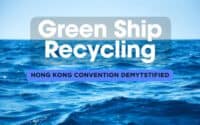Sustainable Solutions: Are Green Lubricants Worth the Switch?

With increasing environmental regulations and a global push toward greener practices, shipowners are at a crossroads: Is it time to switch to eco-friendly lubricants? Green marine lubricants promise sustainability, compliance, and potential savings, but they also come with unique challenges. Let’s dive into the key considerations that can help you decide.
Table of Contents
1. Benefits of Green Lubricants
2. Compliance Requirements for Green Marine Lubricants
3. Financial Considerations
4. Drawbacks and Challenges
5. Applications and Use Cases
6. Industry Trends and Innovations
7. Decision-Making Checklist for Shipowners
Why Consider Green Marine Lubricants?
✅ Regulatory Compliance
Stay ahead of laws like IMO 2020 and the Vessel General Permit (VGP). Non-compliance could mean hefty fines!
🌍 Environmental Benefits
Biodegradable and non-toxic, green lubricants protect marine ecosystems from harmful spills and leaks.
💰 Cost Savings Over Time
Extend equipment life and reduce downtime with high-performance eco-friendly formulations.
🛠️ Enhanced Marketability
Show your clients and partners that you’re serious about sustainability.
⚠️ Challenges to Watch
Higher upfront costs and compatibility issues might require careful planning.
Quick Facts
- Did you know? Ships leak thousands of liters of oil into the ocean annually. Green lubricants can drastically cut this pollution.
- Key Players: Castrol Marine, TotalEnergies, Panolin, and Shell Marine are playing a key role in eco-friendly solutions.
Stay tuned as we explore this topic in depth with actionable insights, from compliance and cost savings to the practical challenges of going green.
1. Benefits of Green Lubricants
Why Go Green?
Green marine lubricants offer a host of benefits that go beyond compliance. They are not just about reducing pollution but also about optimizing operations and creating a competitive edge in the maritime industry. From extending equipment lifespan to appealing to eco-conscious clients, adopting these lubricants can be a strategic move for shipowners.
| ShipUniverse: Benefits of Green Lubricants | ||
|---|---|---|
| Aspect | Details | What It Means for You |
| Environmental Impact | Green lubricants are biodegradable and non-toxic, significantly reducing the risk of pollution from leaks and spills. They also mitigate harm to marine ecosystems by breaking down naturally. | Minimize your environmental footprint and avoid costly cleanup operations or reputational damage. |
| Operational Advantages | These lubricants reduce friction and wear on machinery, extending equipment lifespan and improving efficiency. Fewer breakdowns mean less downtime and lower maintenance costs. | Increase operational reliability while saving money on repairs and replacements. |
| Market Differentiation | Adopting eco-friendly practices helps attract clients and partners who value sustainability. Many large corporations now prioritize working with environmentally responsible companies. | Position your business as a leader in sustainability, gaining a competitive advantage in a growing green market. |
| Regulatory Benefits | Compliance with regulations such as IMO 2020 and Vessel General Permit (VGP) ensures smoother operations and avoids fines or legal disputes. | Operate worry-free in regulated waters while showcasing your commitment to global standards. |
| Enhanced Brand Reputation | Companies using green lubricants are often perceived as more socially responsible, which can boost brand loyalty and public trust. | Leverage your environmental initiatives in marketing to strengthen your brand’s image. |
| Easier Disposal and Waste Management | Biodegradable lubricants simplify waste management processes, reducing costs and risks associated with disposal. | Streamline environmental compliance efforts and waste handling logistics. |
| Improved Worker Safety | Green lubricants often have lower toxicity levels, reducing health risks for crew members who handle them. | Enhance crew safety and reduce liabilities related to workplace hazards. |
| Resilience in Ecologically Sensitive Areas | Operating in areas like Arctic or marine reserves requires extra caution. Green lubricants are better suited for such sensitive zones, ensuring compliance and environmental protection. | Gain flexibility in routing and operations without worrying about ecological impact. |
2. Compliance Requirements
Navigating the Legal Waters
Compliance with environmental regulations is a top priority for shipowners. From IMO 2020 to regional mandates like the Vessel General Permit (VGP), green marine lubricants are increasingly seen as an essential step toward meeting these stringent requirements. Understanding where and when compliance matters is key to avoiding fines, protecting ecosystems, and ensuring seamless operations.
| ShipUniverse: Compliance Requirements for Green Marine Lubricants | ||
|---|---|---|
| Aspect | Details | What It Means for You |
| IMO 2020 Regulations | The International Maritime Organization (IMO) requires ships to reduce sulfur emissions and encourages environmentally friendly practices, including the use of biodegradable lubricants. | Ensure your fleet complies to avoid penalties and gain credibility in environmentally sensitive regions. |
| Vessel General Permit (VGP) | The U.S. VGP mandates the use of Environmentally Acceptable Lubricants (EALs) in waters under U.S. jurisdiction to minimize pollution risks. | Mandatory for vessels operating in U.S. waters; non-compliance can lead to fines and operational restrictions. |
| Regional Requirements | Countries like Canada, Norway, and Australia have specific mandates for biodegradable lubricants in sensitive marine areas. | Research local laws for each port of call to ensure seamless operations and avoid legal issues. |
| When Compliance Matters | Compliance is especially critical in ecologically sensitive zones, such as marine reserves or areas with high biodiversity. | Plan routes and prepare documentation for operations in regulated zones to avoid delays or penalties. |
| Key Takeaways | Green lubricants are not just about meeting regulations; they also help build a reputation for environmental responsibility and ensure smoother operations in key regions. | Adopting green lubricants ensures compliance, minimizes risks, and supports long-term operational sustainability. |
3. Financial Considerations
Balancing Costs and Savings
Switching to green lubricants involves an upfront investment, but the long-term financial benefits can outweigh the initial costs. From reducing maintenance expenses to accessing tax credits, these lubricants offer compelling economic advantages for shipowners.
| ShipUniverse: Financial Considerations for Green Lubricants | ||
|---|---|---|
| Aspect | Details | What It Means for You |
| Upfront Costs | Green lubricants typically cost 10-30% more than conventional alternatives. For example, a standard 55-gallon drum of biodegradable lubricant can range from $600-$800 compared to $500-$600 for traditional oil. | Plan for a higher initial expense but budget for potential long-term savings in maintenance and compliance costs. |
| Long-Term Savings | Reduced friction and wear on machinery lead to extended equipment lifespan and fewer breakdowns. Lower environmental risks mean avoiding costly fines or cleanup operations. | Save on repairs, replacements, and compliance-related expenses while improving operational efficiency. |
| Incentives | Governments and environmental agencies often offer tax credits, grants, or subsidies for adopting green technologies, including biodegradable lubricants. For example, some EU programs provide partial funding for eco-friendly maritime initiatives. | Explore available incentives to offset upfront costs and make the switch more financially viable. |
| Cost Predictability | Green lubricants offer stable pricing trends due to reduced reliance on petroleum, which is subject to volatile global markets. | Enjoy more predictable operational costs, aiding in long-term budgeting and financial planning. |
| Insurance Benefits | Some insurers offer lower premiums to operators using eco-friendly lubricants due to reduced environmental risk and improved equipment reliability. | Save on insurance costs while showcasing proactive risk management. |
4. Drawbacks and Challenges
Weighing the Challenges
While green lubricants offer undeniable environmental and operational benefits, they come with their own set of challenges. These drawbacks must be carefully considered to make an informed decision about their adoption. Below is a detailed breakdown of the key challenges, addressing their implications and potential solutions.
| ShipUniverse: Drawbacks and Challenges of Green Lubricants | ||
|---|---|---|
| Aspect | Details | What It Means for You |
| Higher Initial Costs | Green lubricants typically cost 10-30% more than conventional lubricants. For instance, a gallon of biodegradable oil might cost $15-$20 compared to $10-$12 for traditional oil. | Be prepared for the upfront expense and conduct a cost-benefit analysis to justify the investment through potential long-term savings. |
| Compatibility Issues | Older equipment may not be designed to handle biodegradable lubricants, potentially requiring retrofitting or modifications. Issues like seal degradation or incompatibility with existing systems can arise. | Consult with equipment manufacturers and suppliers to ensure compatibility and avoid unexpected technical failures. |
| Availability | Green lubricants may not be readily available in remote ports or less-developed maritime markets, potentially leading to delays or higher procurement costs. | Develop reliable supply chain partnerships and consider stocking lubricants in advance for critical routes. |
| Performance Variability | Green lubricants may not always match the performance of synthetic or petroleum-based alternatives, especially under extreme operating conditions like high temperatures or heavy loads. | Evaluate product specifications and field-test green lubricants under operating conditions before full-scale adoption. |
| Storage and Shelf Life | Biodegradable lubricants often have shorter shelf lives compared to conventional oils and may require specific storage conditions to maintain their effectiveness. | Monitor inventory levels carefully and follow storage guidelines to minimize waste and ensure consistent performance. |
| Cost Predictability | The cost of green lubricants may fluctuate due to limited suppliers or production capacity, leading to unpredictable operational expenses. | Lock in supplier contracts with fixed pricing where possible to avoid unexpected cost hikes. |
5. Applications and Use Cases
Where Green Lubricants Shine
Green marine lubricants are versatile and can be applied across various ship systems to ensure both environmental compliance and operational efficiency. Below is a detailed breakdown of the primary areas where these lubricants prove most beneficial, helping shipowners make informed choices for their fleets.
| ShipUniverse: Applications and Use Cases for Green Lubricants | ||
|---|---|---|
| System | Details | What It Means for You |
| Propulsion Systems | Used in engines, gearboxes, and stern tubes, green lubricants reduce friction, wear, and the risk of oil leakage into marine environments. | Ensure smoother propulsion operations while meeting environmental standards, particularly in regulated waters. |
| Hydraulic Systems | Essential for deck machinery like cranes, winches, and hatch covers, biodegradable hydraulic oils minimize environmental risks if leaks occur. | Operate deck systems confidently, knowing spills won’t harm sensitive marine ecosystems. |
| Thruster Systems | Applied in bow and stern thrusters, these lubricants maintain high performance while reducing the risk of environmental contamination. | Optimize thruster efficiency and comply with regulations in ecologically sensitive ports or waterways. |
| Deck Equipment | Green greases and oils are ideal for mooring winches, hatches, and other deck equipment, providing long-lasting protection against corrosion and wear. | Reduce maintenance frequency and extend the lifespan of vital deck equipment. |
| Cooling Systems | Environmentally friendly oils can be used in cooling systems to ensure efficient heat management while meeting green compliance standards. | Prevent overheating with lubricants that support both equipment reliability and environmental goals. |
| Auxiliary Engines | Green lubricants for auxiliary systems like generators provide reliable performance while reducing emissions and leaks. | Maintain auxiliary power systems efficiently and meet compliance in port operations. |
6. Industry Trends and Innovations
The Future of Sustainable Shipping
Green lubricants are no longer just about compliance; they are part of a broader movement toward innovation and efficiency in maritime operations. From cutting-edge bio-lubricants to global adoption by industry leaders, this sector is evolving rapidly. Let’s explore the latest trends and innovations shaping the industry.
| ShipUniverse: Industry Trends and Innovations in Green Lubricants | ||
|---|---|---|
| Trend/Innovation | Details | What It Means for You |
| Plant-Based Bio-Lubricants | Recent advancements in plant-based formulations (e.g., soybean and rapeseed oils) offer high biodegradability and lower toxicity while maintaining robust performance under maritime conditions. | Explore renewable and sustainable options that align with environmental goals and operational efficiency. |
| Synthetic Bio-Lubricants | Synthetic blends combine advanced chemical engineering with bio-based inputs, resulting in lubricants that outperform traditional oils in extreme temperatures and high-stress conditions. | Invest in high-performance solutions suitable for demanding maritime applications while reducing environmental risks. |
| Global Adoption Rates | Reports indicate that 40-50% of vessels in developed markets (e.g., Europe and North America) have transitioned to green lubricants, driven by stringent regulations and client demands. | Benchmark your fleet’s progress against industry leaders and anticipate regional adoption trends. |
| Digital Monitoring for Lubricant Performance | Innovative monitoring tools, such as IoT-enabled systems, allow real-time tracking of lubricant quality and performance, optimizing maintenance schedules. | Leverage technology to reduce waste, lower costs, and ensure optimal performance from green lubricants. |
| Collaborative Research Initiatives | Joint efforts between universities, maritime organizations, and lubricant manufacturers are driving breakthroughs in eco-friendly formulations and applications. | Stay informed about upcoming technologies and partnerships that could enhance your operations. |
| Enhanced Sustainability Certifications | Certifications such as EAL (Environmentally Acceptable Lubricant) and ISO 14001 are gaining traction as benchmarks for sustainable lubricant use. | Highlight certifications in your operations to meet client expectations and improve marketability. |
7. Decision-Making Checklist for Shipowners
Making the Right Choice
Adopting green lubricants can be a transformative step for your fleet, but it requires careful planning and evaluation. This decision-making checklist will help you weigh the key factors and determine whether green lubricants align with your operational and financial goals.
Green Lubricants - Smarter Decisions Checklist
Make smarter decisions for your fleet with this comprehensive checklist. From compliance needs to supplier reliability, ensure you're covering all the essential factors before making the switch to eco-friendly lubricants.
Green marine lubricants represent a powerful opportunity for shipowners to embrace sustainability, comply with regulations, and improve operational efficiency. While they come with challenges such as higher upfront costs and compatibility concerns, their benefits often outweigh these drawbacks over time.
By carefully evaluating compliance needs, financial implications, and operational considerations, shipowners can make informed decisions that align with both environmental and business goals. As the industry trends toward greener solutions, adopting green lubricants is not just a choice—it’s a step toward the future of maritime shipping.

Do you have a Maritime Product or Service that may be of interest to Shipowners? Tell us about it here!
Do you have feedback or insights? Please reach out to editor @ shipuniverse.com




